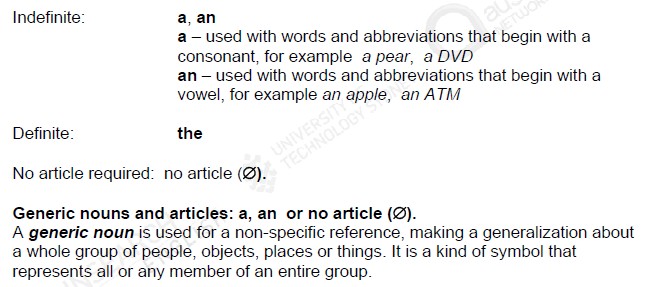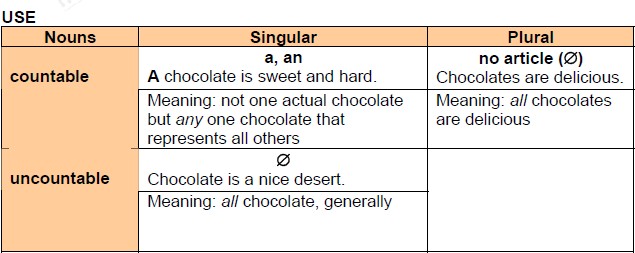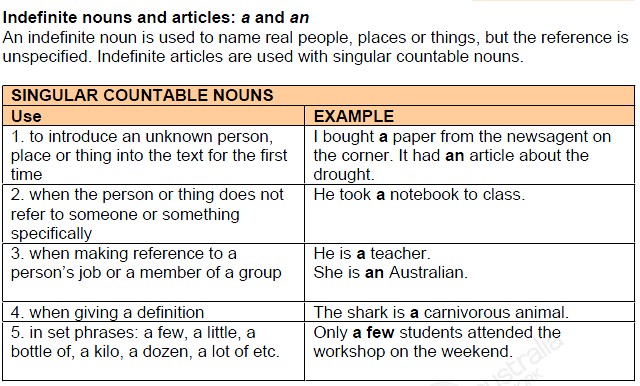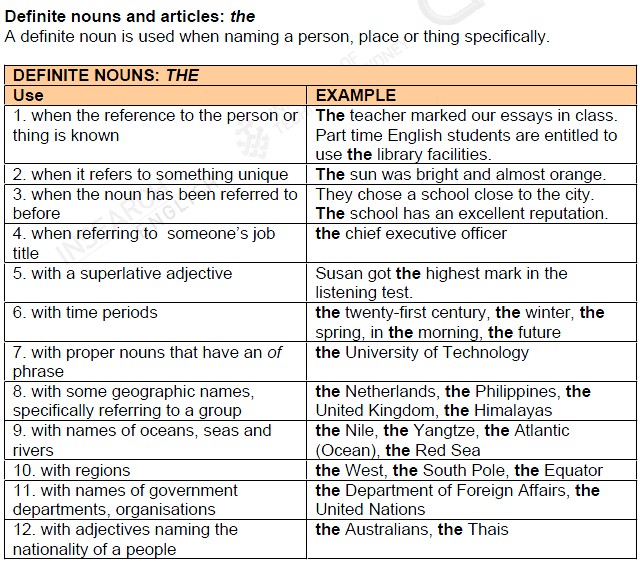Hello. Welcome to Study English, IELTS preparation. I’m Margot Politis.
We’re going to look at articles today – indefinite articles ‘a’ and ‘an’, and the definite article, ‘the’.
But first, let’s meet an oceanographer. She’s talking about using underwater devices to predict weather patterns.
See if you can hear her using articles while she talks about monsoons.
The monsoon gets a lot of its energy from the equatorial and sub-tropical Indian Oceans. Dr Susan VViiffels, an oceanographer from Australia’s CSIRO, is hoping that by measuring the state of the Indian Ocean in those areas, scientists will be able to learn something about monsoon predictability.
Predicting the monsoon is a very difficult thing and yet it impacts on millions and millions of people, and so we think that, if we can predict the monsoon usefully, we can make a real difference.
We know from El Nino that it’s a fully global system, so you just can’t study one small part of the ocean and solve these problems. You really need a global integrated observing system, and the Argo program is the first real big ocean attempt to do that, and it’s the float technology that’s allowed us to even think about doing this.
Using ‘articles’ before nouns is one of the most difficult things in learning English.
You can choose between indefinite articles ‘a’ and ‘an’, the definite article ‘the’, or no article at all.
Let’s start with the indefinite articles ‘a’ and ‘an’.
The rule is that ‘a’ is used before words starting with a consonant, and ‘an’ is used before words starting with a vowel.
So we have ‘a banana’, but ‘an apple.
There are a couple of exceptions to the rule. Where the consonant ‘h’ is not pronounced, we use ‘an’.
So we say ‘a happy man’, but ‘an honest man’. The ‘h’ is not pronounced, so ‘honest’ sounds like it starts with a vowel.
Where the vowel ‘u’ is pronounced like a ‘y’ sound, we use ‘a’.
So we say ‘an umbrella’, but ‘a user’, because ‘user’ sounds like it begins with a ‘y’.
‘A’ and ‘an’ are only used with singular nouns. We use ‘some’ with plural nouns.
The indefinite articles ‘a’ or ‘an’ are used to refer to ‘indefinite’ things, things that aren’t specific. You use them when you’re referring to any member of a group of things. The indefinite article does not refer to a particular thing, but one out of many possible things.
If I say ‘I would like a banana’, I just want any banana, it doesn’t matter which one.
Let’s look at an example of indefinite articles from the clip.
Predicting the monsoon is a very difficult thing and yet it impacts on millions and millions of people, and so we think that, if we can predict the monsoon usefully, we can make a real difference.
She uses the indefinite article twice.
She says ‘predicting the monsoon is a very difficult thing’. There are many things that are difficult to do, and predicting the monsoon is just one of them.
Secondly she says ‘we can make a real difference’. There are many differences that can be made in the world, but she is just talking about one of them.
So when do we use the definite article ‘the’?
Well, we use it when we’re referring to ‘definite, specific’ things. We also use ‘the’ when we’re talking about one particular member of a group.
Luckily there is only one form of the word ‘the’, and it can refer to both singular and plural nouns.
We say ‘the banana’ and ‘the bananas’.
There is a difference in pronunciation though, when ‘the’ comes before a vowel sound, we say ‘thee’, ‘the apples.’
So ‘thee’ before vowel sounds, and `thuh’ before consonant sounds.
Let’s look at the clip again. Listen for ‘the’.
You really need a global integrated observing system, and the Argo program is the first real big ocean attempt to do that, and it’s the float technology that’s allowed us to even think about doing this.
She says ‘the Argo program’. She uses ‘the’ because there is only one Argo program. It’s a unique, particular thing.
She also says ‘the float technology’. She is talking about a particular type of float technology, not just any float technology.
There was a third ‘the’. She said ‘the first real big ocean attempt’.
We use ‘the’ in front of ‘first’, ‘second’ and so on, because they refer to something particular or unique.
There can be only ‘one’ first attempt.
In the same way we use ‘the’ in front of superlatives – ‘the best example’, the biggest banana’ and so on — because there can only be one best, or biggest, of anything.
OK. So that’s the major difference between ‘definite’ and ‘indefinite’ articles, but there are other rules as well.
We use ‘a’ and ‘an’ with countable nouns, that is, if the noun can be counted.
- ‘I ate an apple’ [apples can be counted].
We use ‘the’ with uncountable nouns, with things that you can’t count.
- ‘I swam in the water’ [water cannot be counted].
- ‘I drank the milk’ [milk cannot be counted].
We also use ‘a’ with counting expressions like ‘a bottle of’, ‘a cup of, ‘a bit of.
Listen to this…
The monsoon gets a lot of its energy from the equatorial and sub-tropical Indian Ocean.
She says “The monsoon gets ‘a lot of’ its energy”.
Look at ‘the monsoon’, and ‘the Indian Ocean’.
These are both examples of other rules for ‘the’.
We can use ‘the’ to describe ‘generic nouns’.
A ‘generic noun’ is a noun that describes a category or type of thing. It can often be the same as using a plural noun.
So sometimes ‘the monsoon’ means the same as ‘monsoons’. She’s talking about monsoons in general.
Predicting the monsoon is a very difficult thing and yet it impacts on millions and millions of people, and so we think that, if we can predict the monsoon usefully, we can make a real difference.
We know from El Nino that it’s a fully global system, so you just can’t study one small part of the ocean and solve these problems. You really need a global integrated observing system, and the Argo program is the first real big ocean attempt to do that, and it’s the float technology that’s allowed us to even think about doing this.
And here’s another rule. We also use ‘the’ with oceans, seas, rivers and deserts. We say ‘the Indian Ocean’, ‘the Yangtze River’, ‘the Gobi Desert’. We also use ‘the’ for points on the globe — ‘the Equator’, ‘the Tropic of Capricorn’, `the North Pole’.
Choosing the right article can be very confusing, but if you follow the general rule that you use ‘the’, the definite article, to refer to a particular thing or things, and ‘a’ and `an’, indefinite articles, to refer to one of a number of things, you shouldn’t go too wrong.
OK, so now we’ve seen how to use ‘definite’ and ‘indefinite’ articles, but sometimes we don’t use articles at all before nouns. Let’s look at when to use no article.
We’ve already seen that you can leave the article out when talking about ‘plural generic nouns’. `Monsoons are unpredictable.’ But this is true for uncountable generic nouns too. `Coffee is delicious’. `Happiness is hard to find. “Balls are round.” OK, so let’s look at some sentences…
- ‘I would like a cake.’
[I would like one cake, any cake.] - ‘I would like the cake.’
[I would like that particular cake.] - ‘I like cakes.’
[I like all cakes].
Here, ‘cakes’ with no article is generic. It refers to cakes in general, all cakes.
Well that’s all for today.
Don’t forget to practice those articles!
I’ll see you next time for Study English.
Bye Bye.
Study Notes
DEFINITE AND INDEFINITE ARTICLES
English uses articles to provide information about a noun, whether it is generic, indefinite or definite.
In English there are two types of articles – indefinite and definite.



